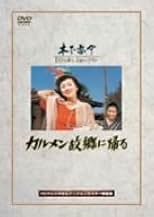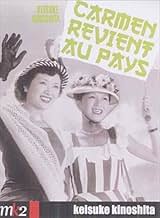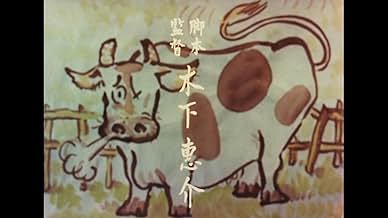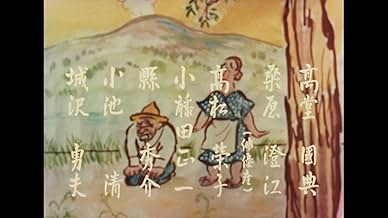IMDb RATING
6.5/10
756
YOUR RATING
A girl who had left her home village for life in Tokyo returns to her home years later, and evokes a scandal when the locals discover that she's a stripper.A girl who had left her home village for life in Tokyo returns to her home years later, and evokes a scandal when the locals discover that she's a stripper.A girl who had left her home village for life in Tokyo returns to her home years later, and evokes a scandal when the locals discover that she's a stripper.
- Awards
- 1 win total
- Director
- Writer
- All cast & crew
- Production, box office & more at IMDbPro
Featured reviews
This was the very first color film made in Japan. It's a relatively simple tale about a small remote village that rests at the foot of a volcano. The people are simple and life is uncomplicated here, even if the people struggle to make ends meet.
Things get interesting when the daughter (Karumen, or Carmen) of one of the townsmen decides that she will be returning for a visit. She had left the village years ago in search of greener pastures in the big city (Tokyo) where she has become a famous dancer. The townspeople have only heard about her celebrity but don't really have a clue as to the content of what has made her famous. It turns out that her performances border on the risque and she is essentially a high-class exotic dancer. Scandal erupts in the town as this fact comes to light.
Now one might assume that with this plot, the logical thing to have happen is that Karumen realizes all the wonderful things she gave up in the small village and that her life in Tokyo as an exotic dancer is hollow. But this being a Japanese movie, it doesn't follow that cliched convention. Instead the message from the film is complex and can be interpreted in many ways: perhaps one man's exotic dancer is another man's performance art; or the world needs exotic dancers to attract more general attention to the arts; or people should be free to decide what type of performance they want to put on and people should be free to decide what type of performance they wish to watch; or maybe in fact while the exotic dancer gets a big audience (and money), her life is indeed hollow compared to the poor (and blind) harmonium player in the village.
At any rate, the movie does not give you a simple and easily interpretable message. Instead it only provides you with many thoughts and leaves it for you to decide what message you think you should take away. This is such a lost art in filmmaking, particularly in today's Hollywood in-your-face heavy-handed manner of giving the audience the 'message'. What's also interesting in the film is the complexity of the characters. They do good things and bad things at different times, and while some might be better than others, no characters are always good, and neither are any always bad. This certainly more accurately reflects real human behavior and again is something that is often missing from mainstream American cinema.
In sum, I think that this film is certainly worth a look, and while it is not likely to blow you away, it is well worth watching for historical reasons, for some magnificent scenery, some intriguing musical numbers and choreography, and for seeing a different way to tell a story in film. 8 out of 10.
Things get interesting when the daughter (Karumen, or Carmen) of one of the townsmen decides that she will be returning for a visit. She had left the village years ago in search of greener pastures in the big city (Tokyo) where she has become a famous dancer. The townspeople have only heard about her celebrity but don't really have a clue as to the content of what has made her famous. It turns out that her performances border on the risque and she is essentially a high-class exotic dancer. Scandal erupts in the town as this fact comes to light.
Now one might assume that with this plot, the logical thing to have happen is that Karumen realizes all the wonderful things she gave up in the small village and that her life in Tokyo as an exotic dancer is hollow. But this being a Japanese movie, it doesn't follow that cliched convention. Instead the message from the film is complex and can be interpreted in many ways: perhaps one man's exotic dancer is another man's performance art; or the world needs exotic dancers to attract more general attention to the arts; or people should be free to decide what type of performance they want to put on and people should be free to decide what type of performance they wish to watch; or maybe in fact while the exotic dancer gets a big audience (and money), her life is indeed hollow compared to the poor (and blind) harmonium player in the village.
At any rate, the movie does not give you a simple and easily interpretable message. Instead it only provides you with many thoughts and leaves it for you to decide what message you think you should take away. This is such a lost art in filmmaking, particularly in today's Hollywood in-your-face heavy-handed manner of giving the audience the 'message'. What's also interesting in the film is the complexity of the characters. They do good things and bad things at different times, and while some might be better than others, no characters are always good, and neither are any always bad. This certainly more accurately reflects real human behavior and again is something that is often missing from mainstream American cinema.
In sum, I think that this film is certainly worth a look, and while it is not likely to blow you away, it is well worth watching for historical reasons, for some magnificent scenery, some intriguing musical numbers and choreography, and for seeing a different way to tell a story in film. 8 out of 10.
In a tiny mountain village where the children are taught to dance to a dirge-like town anthem, comes news that Hideko Takamine is coming home for a visit, since her theater is closed for a week, and bringing her friend, Toshiko Kobayashi. Her father, Takeshi Sakamoto, want to forbid it, even though she has sent home gifts and money since she ran away at 18; he can only imagine how corrupting Tokyo is. However, the school principal, Chishû Ryû, gives him a long lecture about art and culture, and he gives way. The girls are a little strange, showing too much leg, and it isn't until halfway through what seems to be Japan's first color movie that the village discovers the girls' art is the strip-tease.
It must have been a nice change of pace for one of Japan's leading actresses of feminist roles to play a ditzy stripper, but she appears to be having more fun in the part than this rather mild movie calls for. It's mostly about the characters in the small town; as I so often am, I am once again astounded at exactly the same sort of people cropping up in mountainous Japan as in small-town Indiana or Italy, with the same sort of story that might star Mitzi Gaynor or Diana Dors -- you choose your own Continental actress for the part. Keisuke Kinoshita directs facilely, if not deeply, Kiroshi Kusuda handles the color camera as well as he ever did the black & white model, and the mountain scenery is quite lovely. It's clearly a movie where they played it cannily, and the financial results seem to have been good enough to justify a sequel the next year. I'm sure that, having been a child actress on a movie lot at 5, Miss Takamine enjoyed showing a bitof adult skin .... and roaring at Miss Sakamoto like she was Toshiro Mifune.
It must have been a nice change of pace for one of Japan's leading actresses of feminist roles to play a ditzy stripper, but she appears to be having more fun in the part than this rather mild movie calls for. It's mostly about the characters in the small town; as I so often am, I am once again astounded at exactly the same sort of people cropping up in mountainous Japan as in small-town Indiana or Italy, with the same sort of story that might star Mitzi Gaynor or Diana Dors -- you choose your own Continental actress for the part. Keisuke Kinoshita directs facilely, if not deeply, Kiroshi Kusuda handles the color camera as well as he ever did the black & white model, and the mountain scenery is quite lovely. It's clearly a movie where they played it cannily, and the financial results seem to have been good enough to justify a sequel the next year. I'm sure that, having been a child actress on a movie lot at 5, Miss Takamine enjoyed showing a bitof adult skin .... and roaring at Miss Sakamoto like she was Toshiro Mifune.
When I saw "Carman Comes Home" some years ago it struck me as a gentle and well played comedy on familiar themes. The striking thing, as it was the first Japanese Color film, was the photography which was memorable. It seemed on a par with classics of the era and recalled Michael Powell's best films. I would recommend it to anyone, and I hope a version subtitled into English comes to DVD soon. There are so many good to wonderful Japanese films of the classic era this one should not be lost in the shuffle. I saw it at the Japan Center in Los Angeles. There were once several great Japanese movie theaters in L.A.
Part of the fun of following the Japanese greats, however, is that a lot are hard to see and you have to wait for special screenings.
Part of the fun of following the Japanese greats, however, is that a lot are hard to see and you have to wait for special screenings.
As perhaps befits the first Japanese color film the visual elements linger in the mind far longer and more brightly than the story elements. One remembers the pastel dresses of the two visiting Tokyo strippers set against the greens and browns of the austere mountain/ranch location and all presided over by a benign volcano long after the way too cutesy rustic comedy stuff is forgotten. Give it a B minus.
Kin Aoyama (stage name Lily Carmen), who had run away to Tokyo as a young girl, triumphantly returns to her traditional home town as a successful artist, although not in any art form that the locals were expecting. This bright, fun comedy was Japan's first colour production, something that Carmen and her friend and fellow artist Maya's vivid outfits make the most of. Hideko Takamine is excellent as the brash but somewhat fragile ecdysiast and much of the humour revolves around her relationship with the various men in the town, including her father who is appalled at her choice of profession. There is little mention of the recently concluded war in the pacific (other than a teacher who was blinded) but the awkward, sometimes sad, often humorous, blending of Western culture (Carmen's 'look' is very American and her stage name is from the European opera) and traditional Japanese values (represented by her father, lecherously ignored by the rest of the men in the town) is central to the story. The film was a hit in Japan when it came out in the early 1950s but the humour has aged well and both the jokes and the a the star (and her character) should appeal to modern, international audiences. Followed by a much blacker, satiric sequel, 'Carmen's Innocent Love', which I found very odd, but very funny.
Did you know
- TriviaThe first Japanese color film.
- GoofsWhen Carmen and Maya are in the field and Carmen shoves Maya, the camera cuts to a closeup of Maya looking upset, but in the shot before she can be seen laughing under the brim of her hat as Carmen knocks her down.
- Quotes
The principal: It's a violation of human rights to go against her will to dance. Nowadays, profiteering evils like bicycle racing are allowed to flourish. Maruju's scheme for a nude dance show may be less offensive in comparison.
- ConnectionsFeatured in Ijin-tachi to no natsu (1988)
Details
- Runtime1 hour 26 minutes
- Sound mix
- Aspect ratio
- 1.37 : 1
Contribute to this page
Suggest an edit or add missing content




























